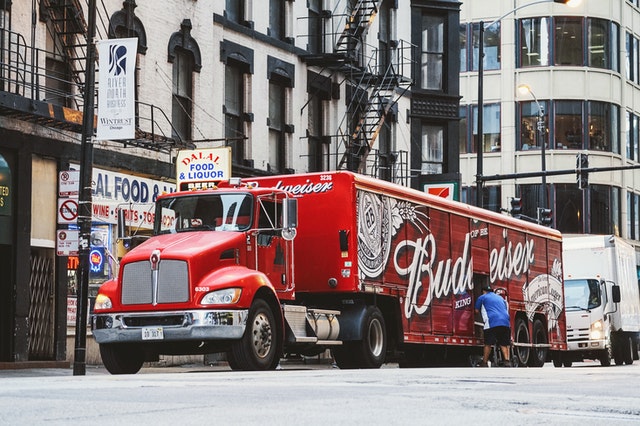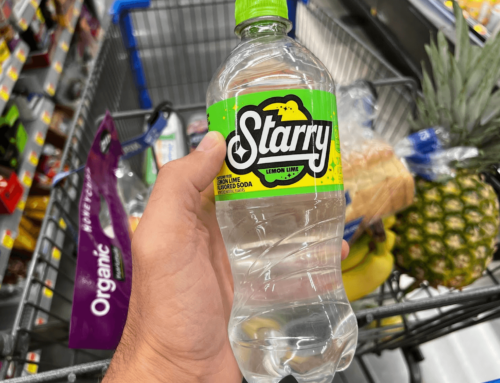A refrigerator truck, also known as a chiller truck, is a van or vehicle that is used to transport perishable goods at a low temperature. Refrigerator trucks can be ice-cooled, fitted with any of a number of mechanical refrigeration systems powered by small displacement diesel engines or use carbon dioxide (either dry ice or liquid form) as a cooling agent. The majority of long-distance refrigerated trucking is done with semis towing refrigerated trailers.
Refrigerated trucks are considered as a vital form of transport for large doses of vaccines that require low-temperature storage in order to preserve its potency. These refrigerated trucks helps distribute medicines nationwide.
Learn more about the critical role the refrigerated truck industry plays in our daily lives with these surprising statistics.

Refrigerator truck.
Refrigerated Trucking Industry Statistics
The food and beverage business is vital to the US economy, accounting for 5% of the country’s gross domestic product. The food industry in the United States is worth $1.4 trillion in total sales. As a result, the growth of the food and beverage industry is expected to fuel a consistent need for refrigerated transportation. (Refrigeration Industry)
Back in 2019, the global refrigerated vehicle industry is estimated to hit $15.5 billion.
Agriculture is one of the refrigerated trucking industry’s most important end-users in the United States. Agriculture’s rising reliance on this business has resulted from the rise of agricultural products and increased trade. (Mordor Intelligence)
The trucker tractors have an average life of roughly 8 years, or 700,000 miles in terms of miles covered. The purchase of refrigerated trailers or a truck-tractor is made as new equipment, leased equipment, or rented equipment in some cases. Because profit margins are currently low, trailer leasing has become a popular form of procurement. (PR Newswire)
The most common means of freight transportation in Europe is by road, which transports 75% of all freight. As demand for refrigerated transportation rises, the cold chain industry is expected to grow by 12% by 2019. (Beroe)
In the second quarter, the average refrigerated truck rate in the United States hit a new high of $2.96 per mile for shipments between 501 and 1,500 miles, up 12 percent from the previous quarter ($2.64 per mile). (USDA)
Prior to the epidemic, the sector was expanding quickly. The market is expected to exceed $20 billion by 2025, according to estimates. (United World Transportation)
In 2017, the global market for refrigerated trucks was $6.36 billion. This market solely comprises autos and excludes services.
Related Reading: 101 Profitable Long Haul Trucking Company Name Ideas
To successfully combat COVID-19, it is projected that 60 to 70 percent of the population will need to be inoculated. As a result, the refrigerated transportation infrastructure will be important in the coming months and years. (United World Transportation)
Truck pricing for shipments traveling between 500 and 2,500 miles has been impacted by high demand for truck services and big volumes. (USDA)
Consumers in France and Germany bought nearly 50% more frozen meals than in the United States. Citizens all over the world began stocking up on frozen meals, and the trend appears to be continuing. (United World Transportation)
The market for refrigerated trucking is estimated to reach EUR 55 billion by 2020. Western Europe accounts for 70% of the refrigerated trucking business, with Germany, France, Italy, Spain, and Belgium leading the way. (Beroe)
Truck traffic decreased by at least 20% in numerous nations. To make matters worse, most restaurants have closed their doors for the time being. (United World Transportation)
Aside from producing and manufacturing food goods, the food and beverage industry has also contributed to the rise of US exports, with roughly $133 billion in increased sales in the foreign market. (PR Newswire)
The United States develops and manufactures over 95% of new medications that enter the market. As a result, the rise in pharma products necessitates proper temperature-controlled logistics, which is likely to propel the market forward. (Refrigeration Industry)
The revenue from dedicated carriage service for many FTL service providers increased by an average of 7% in 2019 compared to 2018. Dedicated carriage service accounts for over a quarter of the fleet of large suppliers, and the number is expanding year on year. (PR Newswire)
COVID-19 only briefly reduced demand for chilled transport. The market is primed for explosive expansion as consumer demand shifts to frozen meals and vaccine delivery as a result of the pandemic. (United World Transportation)
According to industry figures, truckload carriers have annual turnover rates of more than 100%. The tank truck side, on the other hand, has a 30 percent turnover rate, which varies by region and service mode. (Mordor Intelligence)
The reefer truck market is dominated by the food and beverage industry. In the food business, logistics costs account for 71% to 10% of total product costs. Food consumption has increased as a result of the growing number of quick-service restaurants and retail locations, which has raised the demand for chilled and frozen foods and beverages. (PR Newswire)
North America dominated the worldwide refrigerated truck industry in 2017, accounting for 32% of the total.
In 2020, refrigerated trucking prices are predicted to rise by more than 6%. (the freight rates increased by 5 percent in 2019 as compared to 2018). (PR Newswire)
Refrigerated Trucking Industry Trends
The Long-Distance Refrigerated Trucking industry’s revenue growth is predicted to slow in 2020, falling by 10.9 percent. This is largely owing to the pandemic’s decreased demand from key markets, as well as the resulting instability in commodities prices. (IBISWorld)
The demand for frozen variations of various fresh goods has increased as a result of rising consumer health consciousness, as has the demand for the service from residential as well as foodservice businesses such as quick-service restaurants (QSRs), hotels, and other eateries. (iMarc)
Large beverage businesses’ presence in the United States is anticipated to increase demand for chilled vehicles. (Refrigeration Industry)
One of the primary drivers for the worldwide refrigerated transport industry is the rising consumption of frozen food products as a result of sedentary consumer lifestyles and demanding work schedules. (iMarc)
New data from the American Transportation Research Institute shows that vehicles are continuing to move – in many cases faster than usual – in response to the COVID-19 pandemic’s demands on the industry. (Refrigerated & Frozen Foods)
Some of the important trends in the global refrigerated transport industry include the development of efficient cold chain logistics and continual advances in refrigeration technology. (iMarc)
In 2020, the average industry profit margin is predicted to fall, while salaries as a percentage of revenue are expected to rise. The demand for industry services has decreased, and operators have run out of capacity. (IBISWorld)
North America, Europe, Asia Pacific, Middle East, and Africa, and Latin America are the regions that make up the market, with the Asia Pacific dominating the worldwide market. (iMarc)
After India, the United States is second in terms of cold storage warehouse space. According to industry sources, the average occupancy rate for cold storage warehouses in the United States is 85 percent, owing to increased meat supplies and trade disputes. More than 2.5 billion pounds of beef were stored in refrigerated warehouses across the United States in 2017. (Mordor Intelligence)
The expansion of e-commerce has a significant positive impact on the LTL (less than truckload) business as a whole. Dry freight, on the other hand, has a bigger percentage than refrigerated freight. (Research and Markets)
By 2022, the cold chain industry is expected to exceed 3.25 billion tons of goods, showing massive demand growth
Some carriers are proposing salary plans rather than pay by the mile, guaranteed incentives, team bonuses, and guaranteed annual raises in order to promote driver retention. When it comes to recruiting drivers, everyone in the distribution chain must work together to bridge the gap between perception and reality. (Mordor Intelligence)
Organic foods, dairy, and meat are among the foods where packaging is projected to be in high demand. (Refrigeration Industry)
Industry-related operations are projected to result in lower revenue and profit for major and other enterprises. (IBISWorld)
Related Reading: 101 Texting and Driving Prevention Slogans Backed by Statistics
Food consumption has increased as a result of the growing number of quick-service restaurants and retail locations, which has raised the demand for chilled and frozen foods and beverages. (Refrigeration Industry)
Pharmaceutical companies are increasingly using refrigerated shipping options to preserve and carry possible medications and chemicals for treating coronavirus infection. (iMarc)
More items that require temperature-controlled conditions to maintain their integrity and performance have resulted from technological advancements in these domains. (Mordor Intelligence)
The global refrigerated transport market is predicted to develop somewhat during the next five years, according to IMARC Group’s projections. (iMarc)
The demand for refrigerated trucks and transportation is increasing as Canada’s food exports grow. (Refrigeration Industry)
Other factors, such as the implementation of favorable government policies and regulations regarding product production, processing, transportation, and quality, as well as the growing adoption of marine transport vehicles due to their cost-effectiveness, are expected to propel the market even further. (iMarc)

Chiller semi-truck.
Top Refrigerated Trucking Companies
Prime Inc. Founded in 1970, this top refrigerated trucking company is based in Springfield, Missouri. It currently has around 5 to 10 thousand employees across its locations and generates about $2.10 million in sales.
C.R. England. Named after its founder, Chester Rodney England, is one of the oldest trucking companies in the country. It is also one of the country’s largest temperature-controlled carriers based in Salt Lake City, Utah.
KLLM Transport Services. KLLM has been shipping perishable commodities for satisfied customers across the country for over 50 years. Throughout the United States and Mexico, KLLM provides temperature-controlled Over-The-Road, Regional, and Dedicated services.
Swift Refrigerated. Swift Transportation commenced operations on October 10th, 1966, transporting imported steel from Los Angeles to Arizona and Arizona cotton back to Southern California via the ports of Los Angeles. Swift’s terminal network now includes more than forty full-service locations across the continental United States and Mexico. Swift owns 100% of Trans-Mex, a Mexican carrier based in Nuevo Laredo.
Stevens Transport. Stevens Transport was born when Steve sold his first business, Stevens Food, a meatpacking firm in Paris, Texas, in 1979 and returned to Dallas to start his new endeavor, Stevens Transport. Today, it is one of the largest refrigerated trucking companies in the country headquartered in Texas.
Hirschbach Motor Lines. Ray Hirschbach began Hirschbach in the mid-1930s with a single vehicle and the basic premise that delivering specialized, cost-effective, and on-time truck transportation service would result in success for both his company and his customers. Hirschbach’s fleet is among the industry’s newest, most environmentally friendly, and fuel-efficient vehicles.
Marten Transport. At the age of 17, Roger Marten established Marten Transport, Ltd., which delivered milk and other dairy products from the Modena Co-op Creamery. With a $400 loan from his mother, he bought his first truck route. Marten Transport has experienced exceptional development and financial success under the leadership of its new CEO, Randy Marten, throughout the last two decades.
John Christner Trucking. Since 1986, this family-owned company has provided great transportation solutions while maintaining honesty, dependability, and stewardship. John Christner Trucking attributes these three core values to their success today.
TransAm Trucking. TransAm Trucking, which was founded in 1987, has established itself as the leading carrier in the temperature-controlled freight market. TransAm began with 70 tractors and 100 trailers in Kansas City, Missouri, and has since grown to run a fleet of over 1,000 tractors and 1,900 trailers from company headquarters in adjacent Olathe, Kansas.
Black Horse Carriers. Black Horse Carriers is a family-owned business with a strong history dating back over a century. For enterprises in the food and perishables, bakery and dairy, retail and consumer product, automotive and industrial industries, we focus on providing best-in-class Dedicated Fleet Services and Private Fleet Replacement Services.
FFE Transportation Services. FFE Transportation Services, Inc. is Frozen Food Express Services, Inc.’s major operational subsidiary. The company was started in 1946 in Dallas, Texas as an over-the-road transportation company. It provides over-the-road transportation services that are temperature-controlled.
Shaffer Trucking. Shaffer Trucking got its start in New Kingstown, Pennsylvania, hauling chocolate for Hershey, which is now a major client. Shaffer began as one of the earliest domestic shippers of confectionery items and has since grown to become one of the country’s largest food and temperature-sensitive carriers.
Navajo Express. Since the early 1940s, the Digby name has been associated with transportation solutions and innovation. Don Sr. founded Navajo Express in 1981 after purchasing the trademark rights, and his son, Don Digby Jr., now owns and operates the company. Navajo Express is a long-haul and dedicated transportation company based in Denver, Colorado.
Bay & Bay Transportation. Since 1941, Bay & Bay has provided high-quality transportation solutions as a family-owned trucking and logistics firm. They are based in Minneapolis-St. Paul, Minnesota, and provide transportation solutions throughout the United States.
Related Reading: 200+ Creative Car Wash Slogans and Quotes for Profitable Fundraisers
Frialsa Logistica. The company was established in 1995 by Transportes JL Sánchez. As a sole proprietor, they began with a single-vehicle dedicated to refrigerated transport for wide areas, first with Continente, then with Galeras Primero, and finally with Sabeco. They now have a fleet of 23 refrigerated trucks, ranging in capacity and weight from 5 to 33 pallets and 3.5 to 40 tons, with 2-axle, 3-axle, and trailer vehicles.
NFI. Israel Brown founded a haulage company in Vineland, New Jersey, in 1932. What began as a single trucking company has grown into a multi-faceted third-party logistics service with operations across North America. NFI is now regarded as a leading privately held, family-owned company.
Pride Transport. Pride has been a trailblazer in the transportation business since its inception. The company operates a contemporary fleet of late-model tractors that have been designated as a “green fleet.” In 2011, Pride was named one of the top 20 “Best Fleets to Drive For” in the United States.
WEL Companies. Wally Tielens and his two sons, Bruce and Randy, had a clear vision for Wisconsin Express Lines when they founded the company in 1975. The company quickly became a market leader in refrigerated trucking, offering both truckload and less than truckload services. WEL has expanded from its humble beginnings to become multi-faceted transportation, logistics, and storage organization with over 500 trucks and 800 trailers.
J&R Schugel Trucking. Jerry and Rich Schugel had 15 trucks, 20 trailers, and a concept when they launched J&R Schugel Trucking with their father Harold in 1974. The concept was to deliver high-quality service at a reasonable cost to their customers. J&R now has 1,000 power units and over 3,000 trailers in its fleet. J&R has changed a lot over the years, but our commitment to our drivers and employees has remained the same.
Day & Ross. Day & Ross has evolved from a single truckload of potatoes in the 1950s to a fleet of thousands of trucks, making it one of Canada’s largest transportation corporations. They’re a prominent participant in cross-border and LTL/TL transportation, delivering a comprehensive range of transport and logistics solutions across North America, with over 8,000 workers, drivers, and owner-operators.

These trucks keep beer cold too.
Refrigerated Trucking Freight Market Data
The Direct China Chamber of Commerce (DCCC) estimates that the country’s overall imports will exceed USD 3.00 trillion by 2020. Frozen beef, pig, fish, and meat products are among the most common foods imported into the country. (Market Watch)
Shippers and freight management companies, according to PS Industry Research, estimate the reefer container market to increase at an annual pace of 8.0 percent over the next nine years. (FreightWaves)
Spot rates typically continue their trek south following the Fourth of July, with the exception of 2020. Last week, dry van, reefer, and flatbed prices all did so, but 2021 spot rates for all three equipment types are still $0.70/mile more than last year and $0.76/mile higher than the 5-year post-July 4 average. (DAT)
Since 2012, the food and healthcare industries in the United States, which are the principal users of refrigerated transportation, have been gradually rising. As a result, the demand for refrigerated transportation has increased. Production of meat and poultry has increased from 93 billion pounds in 2012 to about 100 billion pounds in 2017. As a result of the increased production, there is a higher need for transportation. (Refrigerated Transporter)
When items are delivered in one direction, a truck must return with an empty cargo hold. The return trip laden with supplies, on the other hand, accounted for 20-30% less than the first trip for suppliers prior to the lockdown.(Allied Market Research)
The dynamic of cross-border shipping is noteworthy. Around 80% of trucks crossing the border from the United States to Canada are flying the Canadian flag. Carriers flying under the American flag are more likely to stay in the United States. (C.H. Robinson)
During the period 2021-2025, refrigerated trucking services would expand at a CAGR of 5.59 percent. During the predicted period, prices will rise by 1.45 percent to 2.40 percent, and suppliers will have significant bargaining power in this market. (Spend Edge)
The global refrigerated transport market was valued at USD 14.8 billion in 2019, according to Reports and Data, and is expected to increase at a CAGR of 5.9% from 2019 to 2027, reaching $23.1 billion. (Market Watch)
The major players in the refrigerated transportation services market are Deutsche Post AG, United Parcel Service Inc., FedEx Corp., Deutsche Bahn AG, Kuehne + Nagel International AG, Nichirei Corp., NewCold Coöperatief UA, Kloosterboer, United States Cold Storage Inc., and Tippmann Group. (Spend Edge)
Canada is anticipated to be short 25,000 drivers by 2023, according to Trucking HR Canada. This year’s vacancy rate is 25% greater than previous years. (C.H. Robinson)
Related Reading: 201+ Powerful Anti-Bullying Campaign Slogans That Promote Change
Many governments have already permitted the opening of transporter booking and delivery offices, although the freight sector is expected to take time to recover. (Allied Market Research)
In the Class-8 tractor pool, net growth is expected to be 2.5 percent to 3%. It has yet to be determined how to seat those vehicles and align them with demand increases in a post-lockdown environment. (C.H. Robinson)
Similarly, medicine sales in the United States have been increasing at a 5 percent to 6 percent annual rate. In the United States, biologics are the fastest-growing medicine category. These are items that need to be kept at a specific temperature. As a result, the increased development and marketing of biologics in the United States is likely to strengthen the refrigerated transportation business in the future years. (Refrigerated Transporter)
Lockdowns around the world have exacerbated driver scarcity, while the lack of cargo for return trips has pushed up truck freight costs, putting pressure on the pricing of key commodities. (Allied Market Research)
As a result of these exceptional circumstances, the logistics industry has taken a hit. However, when limitations are gradually eased and things return to normal, the industry is regaining ground. (FreightWaves)
Many governments have gradually lifted limitations on industrial activities, but migratory workers have returned to their homes, exacerbating problems in the transportation business. (Allied Market Research)
With a market share of more than 58 percent in 2017, the food and beverage industry topped the market, followed by the healthcare industry. Over the projected period, the healthcare category is expected to gain more than 4% market share, while the food and beverage and other segments are expected to lose market share. (Refrigerated Transporter)
The e-commerce market has grown significantly in recent years as a result of the growing number of individuals who use the internet, where every product is just a few clicks away. Customers have been drawn to the e-commerce business, which has aided the transportation market’s growth as ordered products are transported via various methods. (Allied Market Research)
In 2018, there were 2,237 refrigerated transportation companies in the United States.




